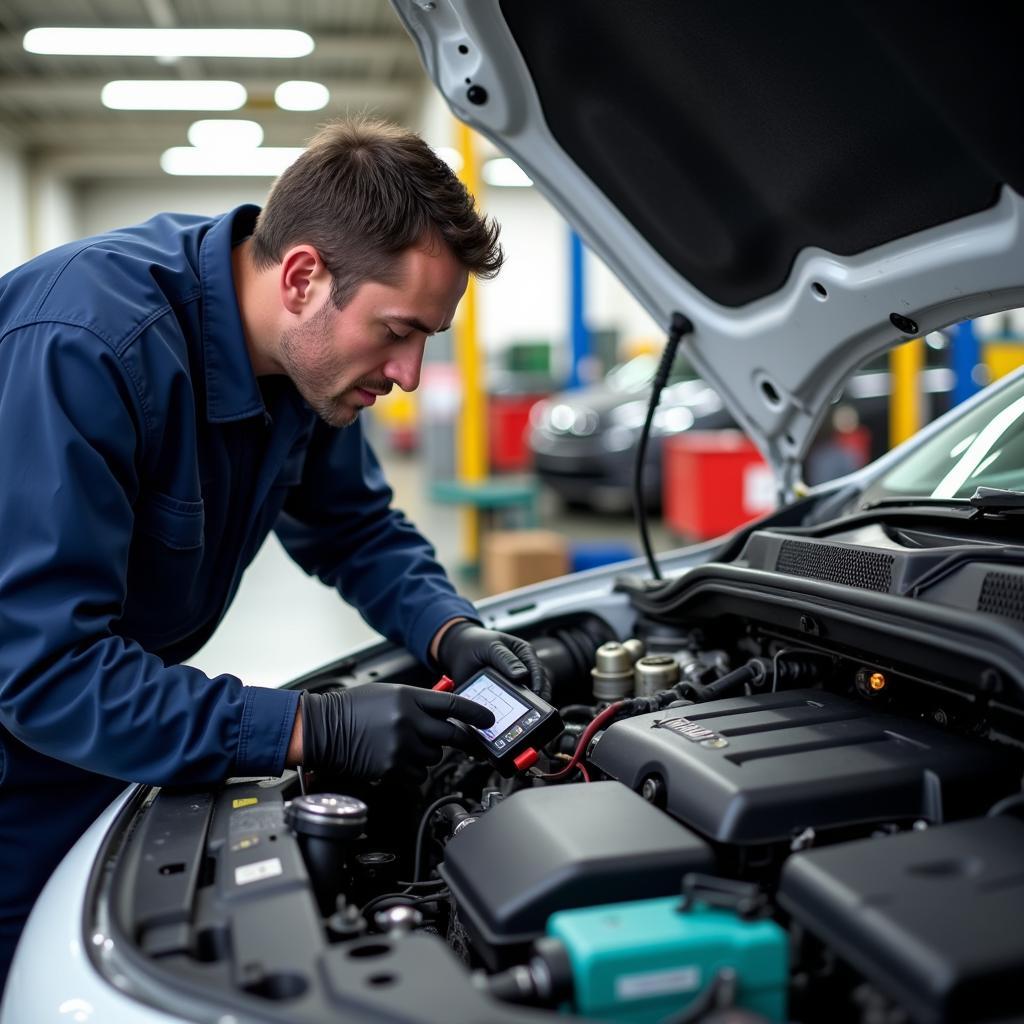Recognizing the Most Common Car Problem Symptoms is crucial for both car owners and mechanics. Understanding these signs can help prevent costly repairs, ensure road safety, and extend the life of your vehicle. This guide will walk you through the most frequent car issues, their symptoms, and potential solutions.
Is your car making a strange noise? Does it feel different when you drive? These can be early indicators of a problem. Don’t ignore them. Addressing car issues early can often save you money and hassle. Check out our guide on automatic car gear problem.
Identifying Common Car Troubles
Several symptoms can indicate underlying car problems. Here are some of the most common:
- Unusual Noises: From squealing brakes to knocking engines, unusual noises often signal trouble. A grinding sound when braking could mean worn brake pads. A knocking sound from the engine could indicate a serious internal issue.
- Fluid Leaks: Check your parking spot regularly. Leaks can range from harmless condensation to serious issues with oil, coolant, or transmission fluid. Each fluid has a distinct color and smell, which can help identify the source of the leak.
- Warning Lights: Never ignore illuminated warning lights on your dashboard. They are designed to alert you to potential problems. From the check engine light to the oil pressure warning, these lights provide valuable diagnostic information.
- Performance Issues: Changes in your car’s performance, such as decreased fuel efficiency, difficulty starting, or sluggish acceleration, can all point to mechanical issues. Don’t wait for these issues to worsen before seeking professional help.
You can find helpful resources online, such as articles discussing problems with AMT cars, which can provide valuable insights. See our article on problem with amt cars.
Diagnosing the Most Common Car Problem Symptoms
Diagnosing car problems accurately requires a systematic approach. Here’s a breakdown of how to approach common car symptoms:
Engine Problems
- Rough Idling: This could be due to spark plug issues, a clogged fuel filter, or a vacuum leak.
- Overheating: Check the coolant level and look for leaks. A malfunctioning thermostat or a faulty radiator fan could also be the culprit.
Experiencing gear shifting issues? Our article on troubleshooting car gear problems offers practical advice. Check it out: my car is having problems changing gears.
 Mechanic Inspecting Car Engine
Mechanic Inspecting Car Engine
Brake Issues
- Squealing or Grinding Brakes: This is often a sign of worn brake pads.
- Soft Brake Pedal: This could indicate a leak in the brake lines or a problem with the master cylinder.
“Regular maintenance is key to preventing many common car problems,” says John Miller, a certified automotive technician with over 20 years of experience. “Simple checks like monitoring fluid levels and paying attention to unusual noises can save you a lot of trouble down the road.”
Transmission Problems
- Slipping Gears: This is a serious issue that requires immediate attention. It could indicate low transmission fluid or internal damage.
- Rough Shifting: This could be due to a clutch problem (in manual transmissions) or issues with the transmission fluid or solenoids (in automatic transmissions).
 Car Fluid Leaks on Ground
Car Fluid Leaks on Ground
Looking for information on cars with common problems? Check out this resource: cars with most problems 2015.
Maintaining Your Vehicle to Avoid Problems
Regular maintenance is crucial for preventing most common car problem symptoms. Following your car’s recommended maintenance schedule can help identify and address potential issues before they become major problems.
“Early detection is half the battle when it comes to car repairs,” adds Sarah Johnson, an automotive engineer specializing in vehicle diagnostics. “By staying proactive with maintenance, you can significantly reduce the risk of unexpected breakdowns and expensive repairs.”
Key Maintenance Tasks:
- Regular Oil Changes: Follow the manufacturer’s recommended oil change intervals.
- Brake Inspections: Check brake pads and rotors regularly.
- Fluid Level Checks: Monitor coolant, brake fluid, power steering fluid, and transmission fluid levels.
- Tire Pressure and Rotation: Maintain proper tire pressure and rotate tires according to the recommended schedule.
For Audi-specific issues, you can refer to our guide on common Audi problems and solutions: audi car problems and solutions.
Conclusion
Recognizing the most common car problem symptoms is essential for maintaining your vehicle’s health and ensuring your safety. By understanding the signs and taking proactive steps, you can prevent costly repairs and extend the life of your car. Don’t hesitate to contact us at AutoTipPro for assistance with your car maintenance and repair needs. Our team of experts is ready to help you get back on the road. Call us at +1 (641) 206-8880 or visit our office at 500 N St Mary’s St, San Antonio, TX 78205, United States.
FAQ
-
What does a check engine light mean?
- The check engine light can indicate a wide range of issues, from minor sensor malfunctions to serious engine problems. It’s crucial to get your car diagnosed to identify the specific cause.
-
Why is my car overheating?
- Overheating can be caused by low coolant levels, a faulty thermostat, a malfunctioning radiator fan, or other cooling system issues.
-
What causes squealing brakes?
- Squealing brakes are often a sign of worn brake pads.
-
What are the signs of a transmission problem?
- Common transmission problems include slipping gears, rough shifting, and delayed engagement.
-
How often should I change my oil?
- Follow the manufacturer’s recommended oil change intervals, which are typically every 3,000 to 5,000 miles for conventional oil and 7,500 to 10,000 miles for synthetic oil.
-
How can I prevent car problems?
- Regular maintenance, including oil changes, fluid level checks, and inspections, is crucial for preventing car problems.
-
What should I do if my car is making a strange noise?
- It’s best to have the noise checked by a mechanic to determine the cause and prevent potential damage.




Leave a Reply